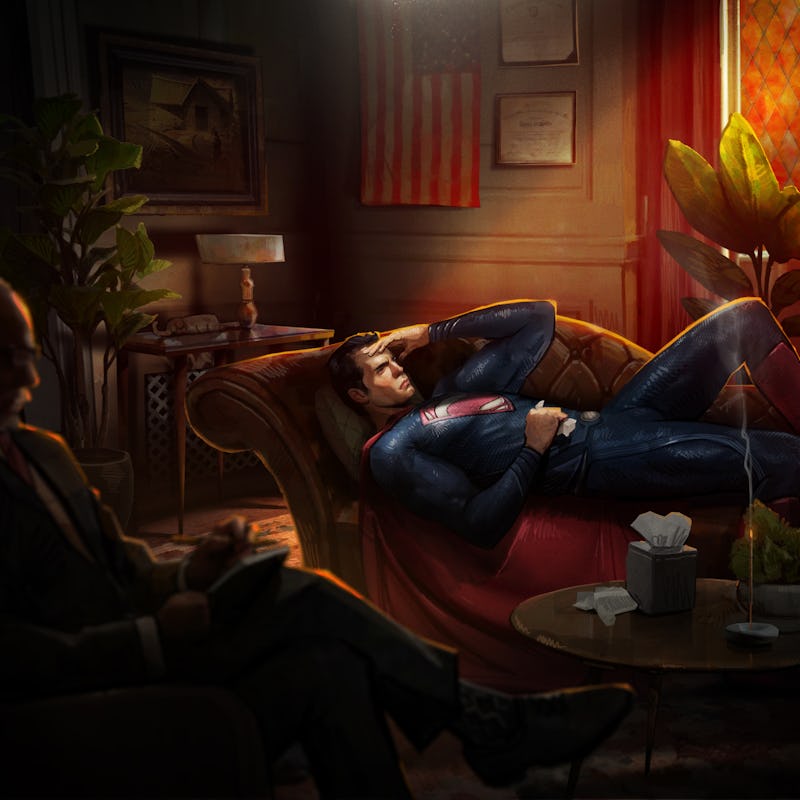Zack Snyder Introduces the 2024 Superhero Issue
The director of 300, Justice League, and more teams up with Inverse for a special issue all about taking superheroes and comic books seriously.

As someone who grew up immersed in the endlessly inspiring pages of comic books, my journey began with the provocative pages of Heavy Metal, an anthology that opened my eyes to the limitless potential of illustrated storytelling.
Heavy Metal was a revelation. It showed me that comics could go beyond superheroes and children’s tales, delving into truly adult themes like sexuality, violence, and morality. What stood out to me was the work of many European artists and writers who brought different, more mature perspectives — ones rooted in a distinctly European morality, especially regarding sex and graphic illustration. This shift in perspective changed how I saw illustrated storytelling. I began to understand that comics could explore complex, raw, and uncomfortable themes in ways that felt both mythological and artistic.
“Heavy Metal was a revelation.”
From there, I delved into the seminal works of Frank Miller’s Ronin and The Dark Knight Returns. These iconic narratives reshaped my understanding of comic books, revealing them as profound reflections of our society.
One of the most transformative moments for me was in The Dark Knight Returns, with the line, “The rain on my chest is a baptism… I’m born again.” This moment transformed Batman into something larger than life, a mythic figure whose struggles were not just physical but deeply emotional. Yet, at the same time, Miller made him profoundly human. He wasn’t just a superhero defying pain, he was a man confronting the very real toll of time and struggle, determined to rise above it and find his own relevance in the world.
In this way, Batman became a mirror for our own struggles — his mythic battle against evil reflected the very human challenges we all face, especially as we wrestle with identity, purpose, and the passage of time. It was this depth that drew me into the world of adult comic books and made me realize their potential to explore universal themes.
“Batman became a mirror for our own struggles — his mythic battle against evil reflected the very human challenges we all face, especially as we wrestle with identity, purpose, and the passage of time.”
This evolution of the superhero from something raw and human, as seen with Batman, moves into more complex territory with Alan Moore’s Watchmen. Here, the superhero concept reaches its final form in Dr. Manhattan. One of the most impactful moments for me in Watchmen is when Wally Weaver says, “God exists and he’s American. If that statement starts to chill you… a feeling of intense and crushing religious terror at the concept indicates only that you are still sane.”
Dr. Manhattan is no longer just a superhero — he’s something far greater and more terrifying, an embodiment of ultimate power detached from humanity. This concept of religious terror at the idea of a godlike figure being reduced to a tool for national interests is a far cry from the traditional superhero narrative. Dr. Manhattan, who starts as a protector and an agent of the U.S. government, ultimately evolves into something so distant from human experience that he regards people as insignificant. The world’s smartest man is no more important to him than the world’s smartest termite, as he says later. This shift in perspective forces us to confront the darker side of power — when someone, or something, with the capacity to save humanity no longer feels any connection to it.
The superman exists, and he’s American. In a written insert included in Watchmen #4, the newscaster corrects the quote to, God exists, and he’s American.
While we often turn to comic books and superheroes for escapism or entertainment, I urge you to look deeper. Within the colorful panels and extraordinary characters lies a rich tapestry of our modern times and culture. Comics have become our mythology, deconstructing themes of sexuality, violence, morality, and politics. This collection of reported stories about superheroes that I helped to develop with Inverse is distinctly grown-up. From a close look at superhero kink to a history of Batman's love life to the shaping of morality in comics — plus enlightening interviews with two legendary comic book creators — we look at the genre as adult readers with adult lives and adult points of view.
In these narratives, we see the mirroring of societal struggles, whether it’s the critique of authoritarianism in The Dark Knight Returns or the exploration of power and ethics in Watchmen. Superman as a metaphor for American might, and political figures like Nixon and Reagan, cast within graphic narratives, offer us a lens through which to examine the social and political landscapes of their times. These characters and stories challenge us to reflect on the ethical and moral implications of power, heroism, and governance.
As we turn the pages of our favorite comics, I invite you to appreciate them not just as entertainment, but as an often profound commentary on our shared human experience. In the vivid interplay of word and image, we find a mirror reflecting the triumphs, tribulations, and transformative movements of the 20th Century and beyond. Let’s continue to explore, question, and celebrate the depth and diversity of this remarkable art form.
Yours,
Zack
Zack Snyder
Inverse's 2024 Superhero Issue, guest edited by Zack Snyder, explores the genre for what it is: a profound commentary on our shared human experience. Dive into the full issue here.
About the artist: Jeff Paulsrud is a visual development artist who’s worked on movies, TV, and video games. His credits include Overwatch 2, Civilization: Beyond Earth, Call of Duty: Modern Warfare Remastered, Call of Duty, Black Ops 4, Rebel Moon Part 1, and Twilight of the Gods.